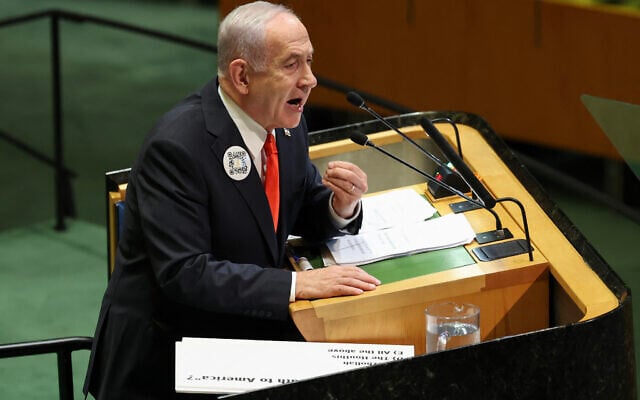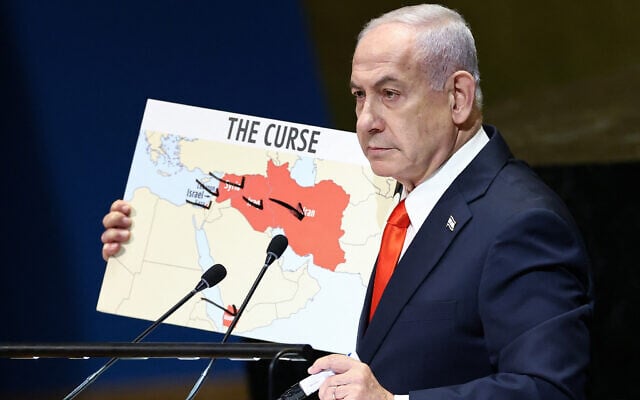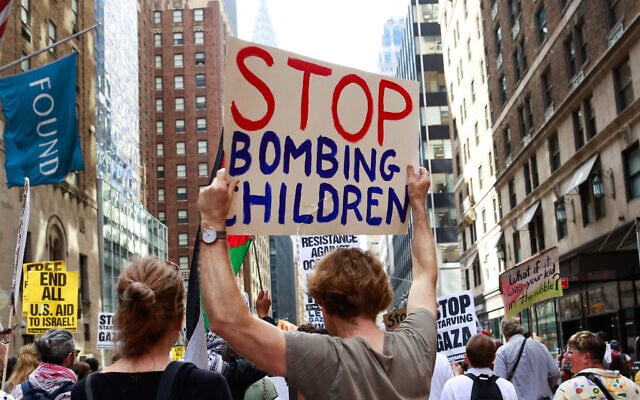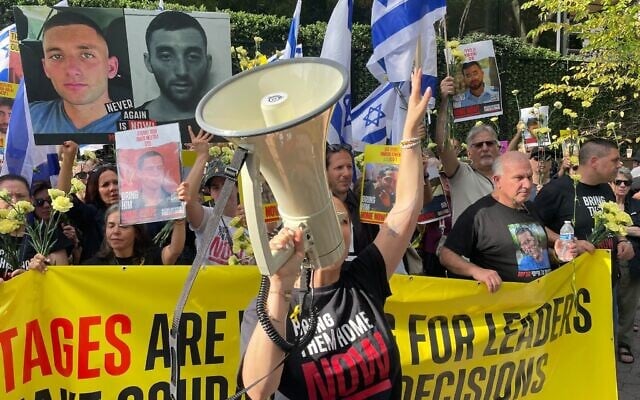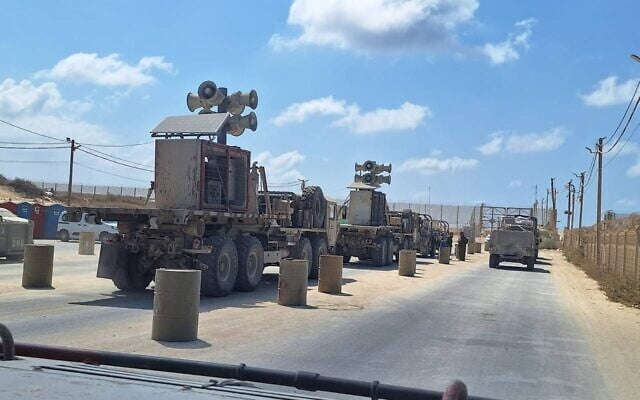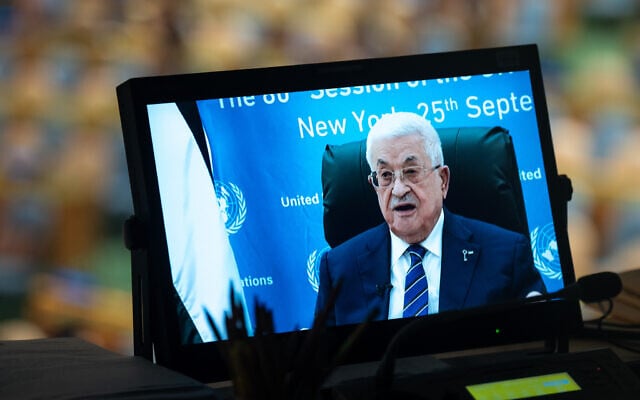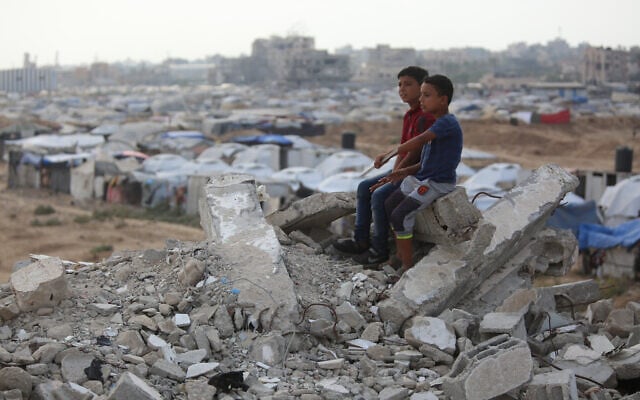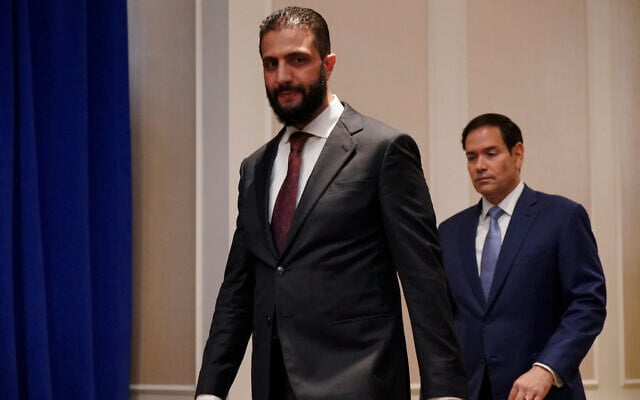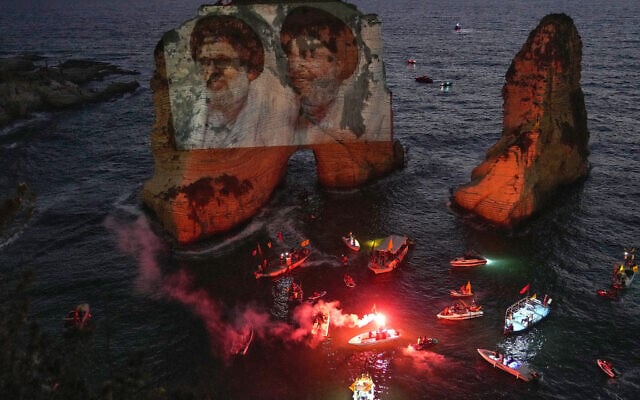

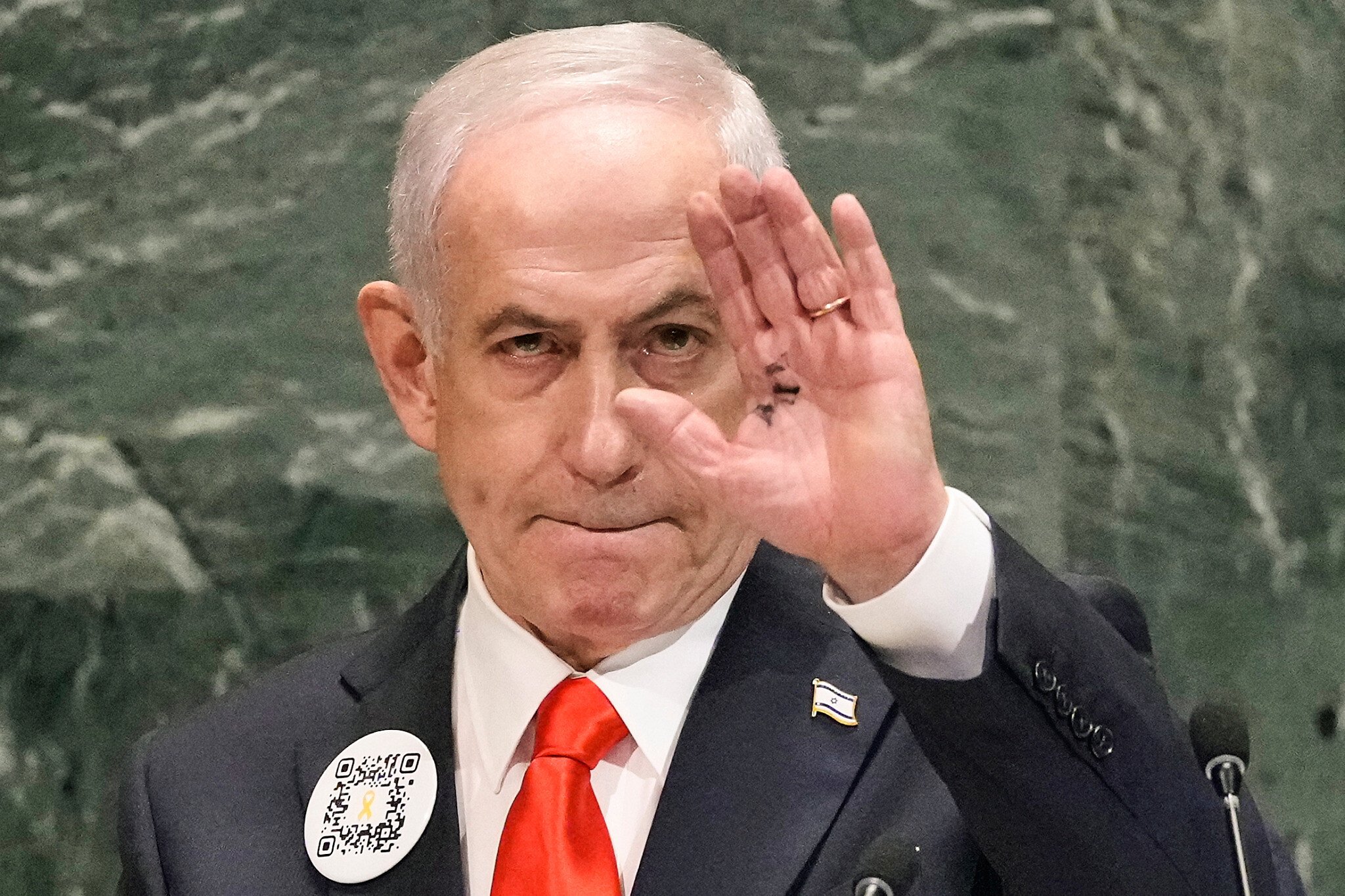
NEW YORK — Prime Minister Benjamin Netanyahu gave a defiant speech to a largely empty UN General Assembly hall on Friday, aggressively defending Israel’s prosecution of the war in Gaza, while excoriating world leaders who have criticized Jerusalem and unilaterally recognized a Palestinian state in recent days.
“Giving the Palestinians a state one mile from Jerusalem after October 7 is like giving Al Qaeda a state one mile from New York City after September 11. This is sheer madness. It’s insane, and we won’t do it,” Netanyahu asserted during his roughly 40-minute address that was rife with gimmicks — even more than the regular handful that he is known to employ each year.
Walking onto the stage as hundreds of diplomats from dozens of countries around the world staged a walk-out that highlighted Israel’s unprecedented diplomatic isolation, Netanyahu donned a QR code on his lapel that he said provided those who scanned it with a link to footage from Hamas’s October 7 so they could “see why we fight and why we must win.”
He opened his remarks by acknowledging the handful of hostage families in the gallery and spoke to them directly in Hebrew in a message Netanyahu said was played through massive loudspeakers that he ordered the Israel Defense Forces to install inside Gaza.
Netanyahu’s office claimed that the IDF also “took control of the phones” of Palestinians in Gaza to broadcast his UN speech “live via those devices.” Gaza residents reportedly received text messages with a link to Netanyahu’s speech, but there was no confirmation of devices being taken over.
Netanyahu insisted that Israel must continue the war, which will enter its third year in less than two weeks, as remnants of Hamas remain in Gaza. He said he was prepared to end the fighting if Hamas releases all the hostages and surrenders completely, holding onto a stance that could well clash with the plan being pushed by the Trump administration for ending the war.
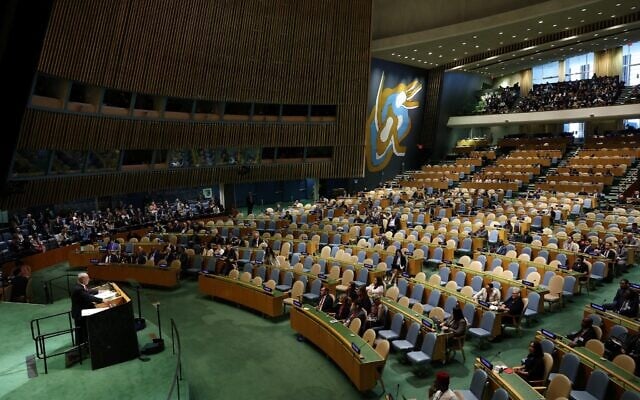
The plan envisions Hamas releasing all 48 remaining hostages, while the IDF gradually withdraws from Gaza and a transitional Palestinian governing body administers the Strip before it is ready to be handed over to a reformed Palestinian Authority, sources familiar with the US proposal told The Times of Israel this week.
An international force would be established to promote security and law and order, along with the disarmament of Hamas. But the latter process will likely be gradual, an Arab diplomat said, highlighting a part of the plan that Israel is likely to oppose.
Moreover, the transitional body’s planned ties to the PA and the plan to transfer authority to Ramallah are another red line for Jerusalem — one that Netanyahu reiterated in his speech on Friday.
Trump presented the plan to Arab and Muslim leaders earlier this week and told reporters outside the White House shortly after Netanyahu’s address that he thinks a deal has been reached. On Thursday, though, he indicated that any finalization will have to wait until after he meets with the Israeli premier on Monday at the White House.
Netanyahu made no mention of the US plan in his UN address and avoided presenting a vision of his own for ending the war and the so-called day after in Gaza.
While he didn’t budge from Israel’s internationally unpopular stances on Gaza, the prime minister expressed optimism regarding the possibility of expanding the Abraham Accords, arguing that peace with Syria and Lebanon was within reach thanks to Israel’s battlefield accomplishments against Iran and its proxies that once dominated both countries.
Netanyahu began his speech by recalling the very different state Israel was in just a year ago, as Iran was rapidly advancing its ballistic missile and nuclear programs in order to destroy Israel.
Hamas leader Yahya Sinwar was still alive in Gaza, commanding Hamas fighters against Israel.
In Lebanon, Hezbollah was still firing rockets at Israeli civilians, and in Syria, then-President Bashar Assad was still hosting Iranian forces, “tightening the noose of deaths around our throats.”
The Houthis in Yemen launched ballistic missiles at Israel “while choking global trade at the mouth of the Red Sea.”
Over the past year, however, things have changed, said Netanyahu. “We’ve hammered the Houthis, including Thursday. We’ve crushed the bulk of Hamas’s terror machine. We crippled Hezbollah, taking out most of its leaders and much of its weapons arsenal.”
“We paged Hezbollah and believe me, they got the message,” he said, referencing Israel’s covert operation that saw the mass detonation of Hezbollah communication devices in September 2024. “Thousands of terrorists dropped to the ground.”
Minutes after Netanyahu’s UN remarks a year ago, Israel assassinated Hezbollah’s longtime leader Hassan Nasrallah in Beirut.
“We destroyed Assad’s armaments in Syria. We deterred Iran’s Shiite militias in Iraq. And most importantly… We devastated Iran’s nuclear weapons and ballistic missiles programs,” Netanyahu said Friday.
The premier then lifted up a map he used in his speech last year, showing the Middle East with Iran-dominated areas in red.
He started using a black marker on the map, titled “The Curse” to tick off where Israel has taken out key enemy leaders in Iran, Yemen, Lebanon, and Syria. The same will happen to Iraqi militia leaders if they attack Israel, he warned.
Netanyahu lauded Israel’s pilots for their success in the 12-day war against Iran in June and thanked Trump for delivering on his promise to prevent Iran from obtaining a nuclear weapon by signing off on a US strike on Tehran’s nuclear facilities.
“We lifted a dark cloud that could have claimed millions and millions of lives,” he claimed before arguing that the job is not yet done.
“We must not allow Iran to rebuild its military nuclear capacity,” he said, adding that Iran’s enriched uranium stockpiles must be eliminated and UN Security Council sanctions on Iran “must be snapped back.”
In Gaza, too, Israel has more work to do, Netanyahu maintained, warning that stopping before Hamas is completely defeated risks allowing the terror group to make good on its pledge to carry out October 7-like attacks “again and again.”
“That is why we want to do so as fast as possible,” he said, apparently recognizing that even the US is not prepared for the war to drag on.
“The final remnants of Hamas are holed up in Gaza City,” he said, justifying Israel’s ongoing operation in the northern city where hundreds of thousands are still sheltering after an even greater number heeded IDF calls to evacuate.
While Trump’s special envoy Steve Witkoff has said he expects the war to wrap up by the end of 2025, IDF officials have warned the government that the Gaza City takeover operation could well require much more time.
Hamas fighters have repeatedly evacuated with the civilian population, and the terror group has managed to reconstitute in areas cleared by the IDF, as Israel has failed to advance a viable alternative to fill the vacuum.
As the death count has crossed 65,000 — according to the Hamas-run health ministry, which doesn’t differentiate between civilians and combatants — the international community has lost its patience with Israel, which was on display during the mass-walkout at the start of Netanyahu’s remarks.
Much of the world “no longer remembers October 7,” Netanyahu lamented. “But we remember. Israel remembers October 7.”
Turning to the plight of the hostages, Netanyahu said that the 20 of them still believed to be alive are “starved, tortured, deprived of any daylight. Deprived of humanity.”
He read out the names of the 20 living hostages, but did not include Tamir Nimrodi or Bipin Joshi — neither of whom has been confirmed as dead, but for whom there are grave concerns for their well-being.
Addressing the hostages directly in Hebrew through the Gaza-placed loudspeakers that ostensibly could reach those in the tunnels below, Netanyahu said, “We have not forgotten you, not even for a second. The people of Israel are with you. We will not falter and we will not rest until we bring all of you home!”
“To the remaining Hamas leaders, and to the jailers of our hostages,” he said, “I now say – lay down your arms. Let my people go. Free the hostages. All of them. The whole 48. Free the hostages now.”
“If you do, you will live. If you don’t, Israel will hunt you down,” he growled.
“If Hamas agrees to our demands, the war could end right now,” he said. “Gaza would be demilitarized. Israel would retain overriding security control. And a peaceful civilian authority would be established by Gazans and others committed to peace with Israel.”
Most hostage families appeared unmoved by Netanyahu’s overtures, though.
The father of hostage Bar Kuperstein twice shouted in agony from his wheelchair in the upper deck of the UN General Assembly hall gallery at Netanyahu, as the premier mentioned the plight of the captives.
Tal Kuperstein suffered a stroke following a serious car accident and has difficulty speaking.
Kuperstein briefly left the hall after his second interruption before returning to listen to the rest of the speech in silence.
Most of the hostage families have fumed at Netanyahu throughout the war, arguing that he has prioritized his government’s survival over the return of their loved ones, while cynically using their plight abroad to gain international sympathy.
Outside the UN, several hundred people led by the families of hostages in Gaza participated in a demonstration against Netanyahu, demanding that he bring them home before time runs out.
As much of the world has turned on Israel en masse as the war has dragged on, Netanyahu insisted that Israel is fighting for democracies everywhere.
He then conducted what he called a multiple-choice pop-quiz, holding up a placard that posed the question, “Who shouts ‘Death to America’?”
The answer is “All of the Above – Hamas, Hezbollah, the Houthis, and Iran.”
The audience shouts out a similar answer for the question, “Who has murdered Americans and Europeans in cold blood?”
“You know deep down that Israel is fighting your fight,” he said.
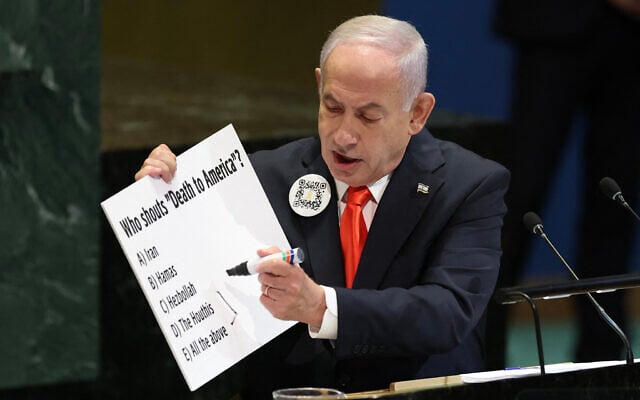
While European leaders showed support for Israel after October 7, “that support quickly evaporated when Israel did what any self-respecting nation would do in the wake of such a savage attack: We fought back,” Netanyahu declared.
Many world leaders “buckled under the pressure of a biased media, radical Islamist constituencies, and antisemitic mobs,” he said. “When the going got tough, [they] caved.”
“As we fight the terrorists who murdered many of your citizens, you are fighting us,” he lamented. “You condemn us. You embargo us. And you wage political and legal warfare, lawfare, against us.”
“This is not an indictment of Israel. It’s an indictment of you!”
“When will you learn? You can’t appease your way out of jihad. And you won’t escape the Islamist storm by attacking Israel.”
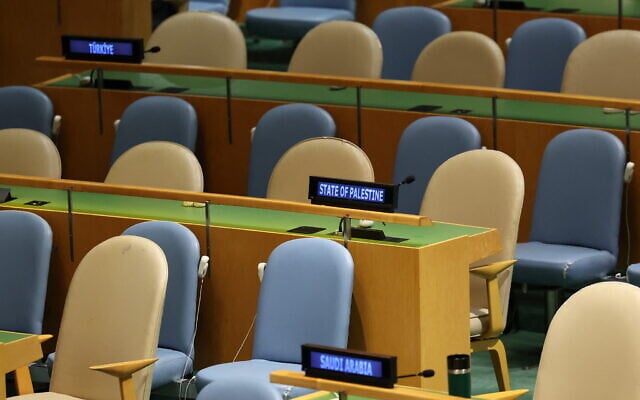
Netanyahu then worked to combat “the false charge of genocide,” insisting that Israel takes steps to avoid harming civilians, while Hamas fights among them. He highlighted
Hamas “is given a pass….While Israel, who does everything it can to get civilians out of harm’s way, Israel is put in the docket,” he said, referring to the International Court of Justice and International Criminal Court cases against Israel and him personally. “What a joke.”
He says the accusation that Israel is starving the people of Gaza is another Gaza, and that “Israel is deliberately feeding the people of Gaza.”
For 78 days in the spring, though, Israel blocked all aid from entering the Strip, hoping the drastic step would coax Hamas into releasing the hostages. It didn’t work and it brought Gaza to the brink of famine.
But Netanyahu said that those who “peddle blood libels and lies against Israel are no better than those who peddled blood libels against Jews in the Middle Ages.”
“These antisemitic lies, they have consequences,” he says, pointing to attacks on Jews in Canada, Australia, The Netherlands, France, the UK, and the US.
He praised the Trump administration for forcefully fighting antisemitism, while other leaders “reward the worst antisemites on earth.”
Turning to the decisions by nearly a dozen Western countries to recognize Palestine earlier this week, Netanyahu claimed they sent a message to the Palestinians that “Murdering Jews pays off.”
He derided world leaders’ talk of a two-state solution, insisting that the Palestinians aren’t interested in living alongside Israel in peace.
“Every time they were given territory, they used it to attack us,” Netanyahu charges.
He said the PA, and not just Hamas, rejects a Jewish state. “You should know that the Palestinian Authority pays terrorists to slay Jews,” he declared.
PA President Mahmoud Abbas signed a decree ending the controversial policy that conditioned payments to prisoners based on the length of their sentence. Israeli officials have continued employing talking points against the policy since, but have not provided evidence demonstrating that stipends have continued unchanged.
Stepping up his criticism of world leaders recognizing Palestine, Netanyahu charged that “what you’re doing is giving the ultimate reward to intolerant fanatics who perpetrated and supported the October 7 massacre.”
With blistering rage, Netanyahu said: “I want to give a message to those Western leaders. Israel will not allow you to shove a terror state down our throats. We will not commit national suicide because you don’t have the guts to face down a hostile media and antisemitic mobs demanding Israel’s blood.”
He also noted that his stance is shared by the vast majority of Jewish Israelis.
“It’s not a fringe. It’s not the prime minister who himself is extreme, or he’s held hostage by extreme parties to his right. It’s over 90% of Israelis. My opposition to a Palestinian state is not simply my policy or my government’s policy. It’s the policy of the state and people of the State of Israel,” Netanyahu said.
“Western leaders may have buckled under the pressure,” he says, concluding this passage of his remarks. “I guarantee you one thing, Israel won’t.”
In the final passages of his speech to the UN, Netanyahu moved away from the Palestinian issue to other regional matters.
He says Israel’s “victories over the Iranian terror axis have opened up possibilities for peace that were unthinkable two years ago.”
“The very idea of peace between Israel and Syria seemed unimaginable” for decades. But today, “we have begun serious negotiations with the new Syrian government.”
“I believe an agreement can be reached that respects Syria’s sovereignty and protects both Israeli security and the security of the minorities in the region, including the Druze minority.”
He said peace between Israel and Lebanon “is possible as well,” and called on the Lebanese government to also begin direct negotiations with Israel. “I commend it for its declared aim to disarm Hezbollah, but we need more than words.”
“If Lebanon takes genuine and sustained action to disarm Hezbollah, I’m sure we can achieve a sustainable peace,” Netanyahu said. “Of course, until that happens, we will take whatever action we need to defend ourselves and to maintain the conditions of the ceasefire which was established in Lebanon.”
Israel has come under fire for regularly carrying out strikes against what it says are Iranian proxies and other foes trying to re-establish themselves in Syria and Lebanon. Even the US has quietly begun pushing back on the strikes, arguing that they undermine efforts to rebuild both countries under leaderships that are already committed to distancing themselves from Tehran.
Further afield, Netanyahu said that while “victory over Hezbollah has made peace possible with our two Arab neighbors in the north, victory over Hamas will make peace possible with nations throughout the Arab and Muslim world.”
On the docket is now “a dramatic extension and expansion of the historic Abraham Accords, which President Trump brokered between Arab leaders and myself five years ago,” he claimed.
He noted the “encouraging words spoken here by the president of Indonesia” earlier this week, highlighting the imperative for Israel to have security. “This is the country with the largest Muslim population of all nations, and it’s also a sign of what could come.”
“Forward-looking Arabs and Muslim leaders know that cooperating with Israel will provide them with ground-breaking Israeli technologies, including in medicine and science, in agriculture and water, in defense, and AI, and so many other fields,” he said.
“I believe that in the coming years, the Middle East will look dramatically different. Many of those who wage war on Israel today will be gone tomorrow. Brave peacemakers will take their place. And nowhere, nowhere will this be more true than in Iran,” he argued.
“The long-suffering Iranian people will regain their freedom. They will make Iran great again. Our two ancient peoples, the people of Israel and the people of Iran, will restore a friendship that will benefit the entire world,” he predicted.


